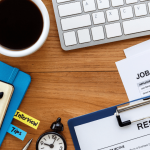Have you never been to a job interview before? Or perhaps you have been to one or two but you know that you performed too poorly to bag that job… If you ticked the “yes box” to any of that, then you’re the reason this article was written; read on for a quick guide in four easy tips.
It is important to know that everything has a first time, and try not to be stressed out about it. Instead, focus on preparation because this will boost your confidence if it’s done right – after all, “knowledge is power” right?
Tip #1
Empower yourself through what you know
It’s not an excuse to not know what to do in an interview because it’s your first time; consider it same as telling the interviewer that you are slothful. That isn’t good for your image as a job seeker. I like to think that anxiety comes from uncertainty, as a result you worry, fear, develop cold feet, and some even avoid the interview completely, none of which will solve the problem at all, because you’ll still be needing a job eventually.
The point is, don’t hide behind ignorance when there’s a whole lot of information around you (the internet is a good place to start). Simply research on whatever – the position, industry, organization, skills etc. Being informed makes you ready to answer questions smartly, which is the best confidence booster in the history of interviews.
Common interview questions are available online. Get yourself acquitted with as many as possible, this doesn’t necessarily mean that the questions will be repeated at your interview, but it gives you a head start. Imagine not knowing how to swim, yet diving into a river without life jacket!
Tip #2
Practice (a lot) before the interview.
Let’s adopt the saying, “practice makes perfect” because it’s the perfect way to explain this point. Are you like me who used to wonder why news casters and actors are flawless when speaking in front of the cameras? Oh! It might interest you to know that it’s simply practice! They put in the work by reading their scripts over and over, and practice a zillion times maybe. If they didn’t, probably no one would wish to listen to them and you could easily guess why.
Similarly, before interviews, you need to rehearse how you will sit, talk, maintain eye contact and all that. You need to learn the appropriate answers for different types of questions, you need to check your grammar. You can ask a friend or family member to be your judge or simply practice in front of a mirror. You can even take it further and watch videos on interviews. Now tell me, can you do all these and still pass out in front of your interviewer for lack of confidence? I guess not.
Tip #3
Dress the part
This may require you to take a course on dress sense… Lol. Well not necessarily. You just need to step out in a clean, well fitted and professional outfit, you may want to avoid flamboyant clothes, colours and inappropriate styles. Just keep it smart, simple and classy. It is serious business not a fun fair.
As common as this may seem, a lot of jobseekers still get it all wrong. I have experienced this countless times as a recruiter and will probably experience much more after publishing this piece, but trust me, you don’t want to be caught up in that mistake. Dress the part for any interview henceforth. It could help to shop for some nice clothes right after reading this, ahead of your next interview. Again, if you don’t know what to do, research on it, watch videos, observe other professionals around you or even on TV. It’s that easy you know. Believe it, your dressing is a great way to boost your self-confidence without trying too hard.
Tip #4
Relax, gather your thoughts before responding to questions.
The questioning segment is where most people literally forget how to speak. That’s when the sweat glands lose control, a voice that’s once loud and vibrant trembles like that of a petrified child, some do ridiculous things like forgetting their names or date of birth and the rest is history… Anxiety attack alert!
It’s like when you have an exam and you come across questions you know the answers, immediately you know what to write down without hesitation. But when you come to questions you do not know, you can’t write anything, your pen is paused in mid-air. What’s the difference? Simply, you are confident in your approach when you know what is required, and you are not when you are clueless. One way to minimize messing up is to think before you talk. Try to relax, gather your thoughts by running a quick check of the best possible answer in your head, before you speak out. I don’t think taking your time before you speak is an offence; however, be careful not to overdo it and give the wrong impression instead.
Hope these tips were helpful? We’d love to hear from you, please leave a comment.


